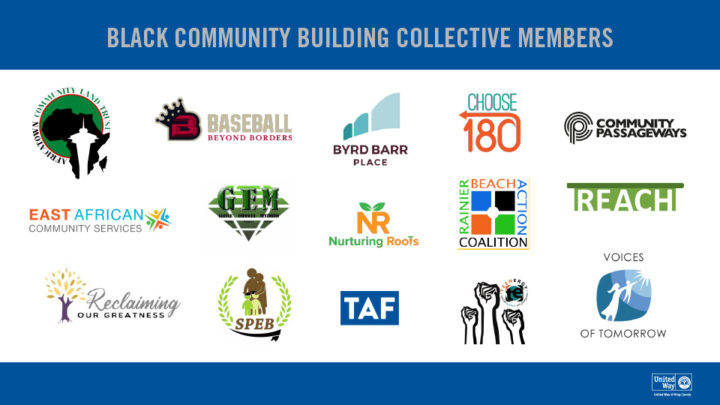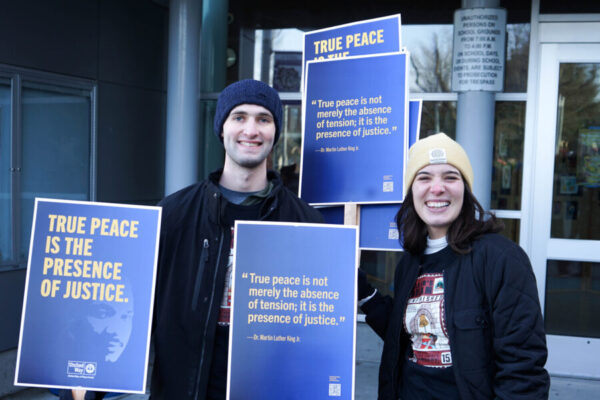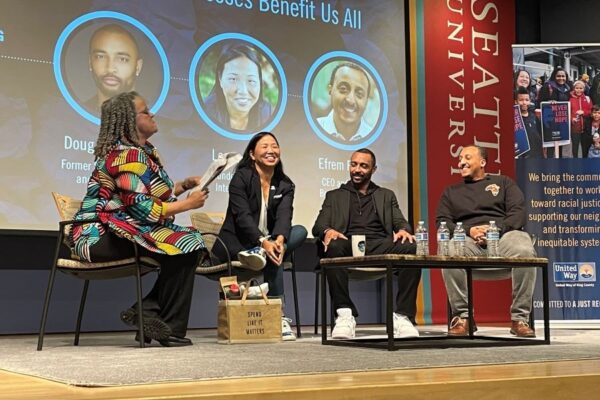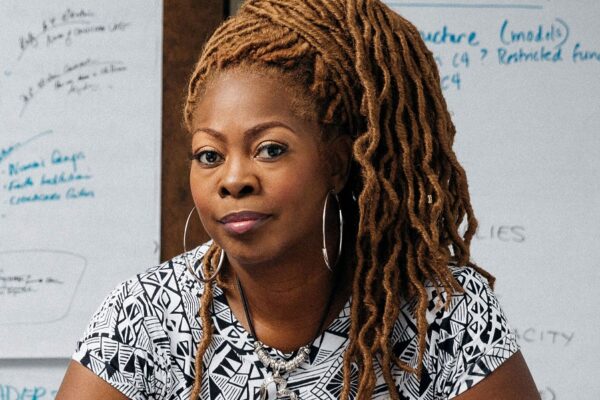Supporting Black-Led Organizations for the Long Term
The murder of George Floyd, and the subsequent protests for racial justice in the summer of 2020, sparked a reckoning in race relations in America. This movement toward racial justice requires long-term commitment and investment from the broader community, including the philanthropic, private and public sectors.
That was one of the themes from a panel of Black-led community leaders during a recent virtual discussion hosted by United Way of King County. The conversation revolved around the new Black Community Building Collective, a network of Black-led, community-based organizations supported by United Way.
The event was sponsored by Black Community Building Collective supporters Brighton Jones and the Sellen Community Foundation.
Gordon McHenry, Jr., president and CEO of United Way, moderated the panel discussion, which included the leaders of three of the 15 organizations that make up the Collective: Marshaun Barber, executive director at Reclaiming Our Greatness; Regina Elmi, executive director and co-founder of Supporting Partnerships in Education and Beyond; and Sean Goode, executive director of Choose 180.
The panel agreed that the movement toward racial justice also requires moving away from being “transactional,” which emphasizes dollars. Instead, it needs to shift toward a genuine, intentional relationship to “build something together over the long run, instead of investing for the moment for a feel-good opportunity,” said Goode.
“When we do engage with a funder, we really ask them, ‘I don’t want you to see yourself as someone that’s giving me money.’ I don’t want to be transactional.”
Regina Elmi
“When we do engage with a funder, we really ask them, ‘I don’t want you to see yourself as someone that’s giving me money.’ I don’t want to be transactional.” Elmi said. She added that she encourages funders to participate in events. “Don’t come there with the intention that you’re monitoring me, or you’re checking up on me. Come in there and volunteer. Come in there and know that you live within this ecosystem.”
A Participatory Mindset
The Collective’s approach is different from traditional philanthropy and charity because it embraces a participatory decision-making and grantmaking model. It is a collaborative effort in which all the members have a say in how it operates.
“The participatory decision-making has been a breath of fresh air because everybody recognizes that it’s a safe space to talk about our issues and what we need and that everybody can come together as a collective to decide what is going to be funded and what is truly needed,” Barber said.
Goode, Choose 180’s director, echoed the sentiment and said it is “special that we get to leverage these resources and figure out how best to activate them.”
Commitment to Lift up Black Women
McHenry noted that United Way committed $3 million over the next two years for the Collective. He added that the organizations made an “intentional choice from an equity and value base to lift up Black women-led organizations.”
During one of the meetings, members of the Collective talked about how funding would be distributed, whether leading with equity or equality. Equity was the consensus, so half the funds would go to the nine Black women-led organizations for operations and capacity building.
“That conversation is something that I’ll never forget. To be able to be vulnerable and for all the Black women to talk about our experiences, I think we all felt seen and understood,” Barber said.
Long-Term Sustainability
Some leaders of the Collective said they experienced a surge of funding offers and invitations to speak and directly address the challenges and opportunities facing the Black community amid the calls for racial justice in 2020. Before the demonstrations, the leaders of the Collective said they struggled to get attention and funds for their communities.
Black staff at United Way led the way in bringing together the leaders of the 15 organizations that now form the Collective. This new effort aimed to address the impact of COVID and counteract the systemic racism that is pervasive throughout society.
“Moving toward that longer-term sustainability and getting funders to invest in the long-term potential of the organization is something that is very much needed.”
Marshaun Barber
One of the common goals of the Collective is to ensure sustainability for the long term.
“Oftentimes we see funders who only want to invest in the direct service work that we do in the community, but not support us to grow and really fulfill our overall mission,” Barber said. “Moving toward that longer term sustainability and getting funders to invest in the long-term potential of the organization is something that is very much needed.”
A Palpable Change
The panelists said there have been some changes in the way people interact with Black-led organizations since the summer of 2020.
“More people are willing to have uncomfortable conversations surrounding race and what it really means to be a Black person in America,” said Barber. “I see a lot of white people willing, more than ever, to unpack their white privilege and do some deeper dive and analysis on what it really means to truly be an ally.”
Elmi said the reaction is partly a result of young people being more involved because they are vibrant, bold and articulate.
“They are saying, ‘This is the world that we want to create, and this is the America that we want to create,’” she said.
Asked by an audience member whether they are seeing an anti- anti-racist movement in Washington similar to what’s happening in other states and communities, the panelists said such movements are not recent.
Elmi said she tells her community members, “None of this is new— people were just hiding it before. And then we had someone to give them a platform to feel extremely comfortable just to bring everything out, and they feel empowered.”
Goode agreed and remarked that even in the Pacific Northwest, a “bastion” of progressives, “We see young people in classrooms who, because of implicit bias, are being pushed out because they’re being obstinate when really they’re simply operating in their adolescence.”
Hope for the Future
While the panelists are hopeful about the future, Goode said it is important to remain grounded. He noted that Black wealth is still a nickel compared to the dollar that white people hold—the same as when Floyd was murdered.
“I understand what we’re reckoning with. This isn’t something that’s going to evolve from impulse or from platitudes, or from momentary injections of resources into historically marginalized communities.”
Sean Goode
“I understand what we’re reckoning with. This isn’t something that’s going to evolve from impulse or from platitudes, or from momentary injections of resources into historically marginalized communities,” Goode said. “It’s going to require a deeper investment from a broader community of stakeholders.”
“I feel rejuvenated knowing that I’m not alone in this work. Being a part of this Collective has been a really valuable experience. And so, I look forward to the future and continue to collaborate with these wonderful leaders,” said Barber.
The panel discussion was part of United Way’s series Advancing Racial Equity. The next event will be held in the fall of 2021.
To support the Black Community Building Collective, please consider making a financial donation.





Comments
Joy Promise
July 7, 2021We have a black owned mobile kitchen fighting food insecurity, how do get information about long term support.